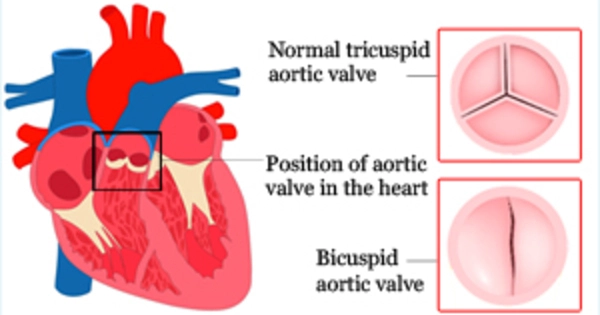Serotonin has not been directly linked to heart valve disease. However, serotonin is a neurotransmitter that affects many bodily functions, including blood pressure and heart rate, and imbalances in serotonin levels have been associated with certain cardiovascular disorders, such as hypertension. More research is needed to determine the potential relationship between serotonin and heart valve disease.
According to a new study led by researchers at Columbia University’s Department of Surgery in collaboration with the Pediatric Heart Valve Center at Children’s Hospital of Philadelphia (CHOP), the University of Pennsylvania, and the Valley Hospital Heart Institute, serotonin can impact the mitral valve of the heart and potentially accelerate a cardiac condition known as degenerative mitral regurgitation.
The findings of the multicenter study, co-led by Columbia’s Giovanni Ferrari, Ph.D., and CHOP’s Robert J. Levy, MD, and funded by the National Heart, Lung, and Blood Institute, were recently published in Science Translational Medicine.
A healthy mitral valve can probably withstand low SERT activity without deforming. It is unlikely that low SERT can cause mitral valve degeneration on its own. SSRIs are generally considered safe for the majority of patients. Once the mitral valve has begun to degenerate, it may be more vulnerable to serotonin and low SERT.
Giovanni Ferrari
Degenerative Mitral Regurgitation
One of the most common types of heart valve disease is degenerative mitral regurgitation (DMR). The mitral valve is located between the heart’s left atrium and left ventricle. When the heart contracts, it closes tightly to prevent blood from leaking back into the left atrium.
The shape of the mitral valve becomes distorted in DMR, preventing the valve from completely closing. This causes blood to leak back toward the lungs (regurgitation), limiting the amount of oxygen-rich blood that can travel through the heart to the rest of the body.
As a result, DMR can cause symptoms such as fatigue and shortness of breath. Because of the decreased efficiency of circulation, the heart has to work harder, causing permanent damage over time. This can result in a variety of serious and life-threatening cardiac problems, such as atrial fibrillation and heart failure.
There is currently no treatment for mitral valve degeneration. “Some medications can alleviate symptoms and prevent complications, but they do not treat the mitral valve,” explains Ferrari, scientific director of Columbia’s Cardiothoracic Research Program. “If the mitral valve degeneration becomes severe, surgery to repair or replace the valve is required.”

The Role of Serotonin
Serotonin is involved in many bodily functions, including emotional state, digestion, sleep, memory, and blood clotting. Serotonin’s role as neurotransmitter aids in mood regulation; low levels of serotonin are linked to anxiety and depression.
Serotonin binds to specific receptors on the surface of a cell, signaling the cell to act. The serotonin transporter (SERT or 5-HTT) protein transports serotonin into the cell to be reabsorbed and recycled, a process known as serotonin reuptake.
Selective serotonin reuptake inhibitors (SSRIs) bind to the SERT and reduce serotonin reuptake, allowing serotonin to be available for longer periods of time. This increased serotonin availability may aid in the treatment of mood disorders. SSRIs are a class of antidepressants that includes well-known medications such as fluoxetine (Prozac) and sertraline (Zoloft).
Study Design
The researchers examined clinical data from over 9,000 patients who had undergone DMR valve repair or replacement surgery, as well as 100 mitral valve biopsies. “When we looked at the data from these patients, we discovered that taking SSRIs was associated with severe mitral regurgitation that required surgery at a younger age than patients who did not take SSRIs,” Ferrari says.
The researchers also used normal mice and transgenic mice lacking the SERT gene to study in vivo mouse models. They discovered that mice lacking the SERT gene had thicker mitral valves, and that normal mice given high doses of SSRIs also had thickened mitral valves.
The researchers used genetic analysis to identify genetic variants in the SERT gene region 5-HTTLPR that affect SERT activity. They discovered that a “long” variant of 5-HTTLPR inhibits SERT activity in mitral valve cells, especially when there are two copies (one maternal and one paternal). Patients with DMR who had the “long-long” variant required mitral valve surgery more frequently than those with other variants.
Mitral valve cells from DMR patients with the “long-long” variant were more likely to respond to serotonin by producing more collagen, causing the mitral valve to change shape. Furthermore, mitral valve cells expressing the “long-long” variant of 5-HTTLPR were more sensitive to fluoxetine than other variants.
Implications for Patients with Mitral Valve Disease
In cells from healthy human mitral valves, the researchers found no negative effect with normal doses of SSRIs or the “long-long” variant. “A healthy mitral valve can probably withstand low SERT activity without deforming,” Ferrari says. “It is unlikely that low SERT can cause mitral valve degeneration on its own. SSRIs are generally considered safe for the majority of patients. Once the mitral valve has begun to degenerate, it may be more vulnerable to serotonin and low SERT.”
Normal doses of SSRIs or the “long-long” variant had no negative effect on cells from healthy human mitral valves, according to the researchers. “A healthy mitral valve can likely withstand low SERT activity without deforming,” Ferrari says. “Low SERT is unlikely to cause mitral valve degeneration on its own. SSRIs are generally safe for the majority of patients. When the mitral valve begins to degenerate, it may be more vulnerable to serotonin and low SERT.”
















